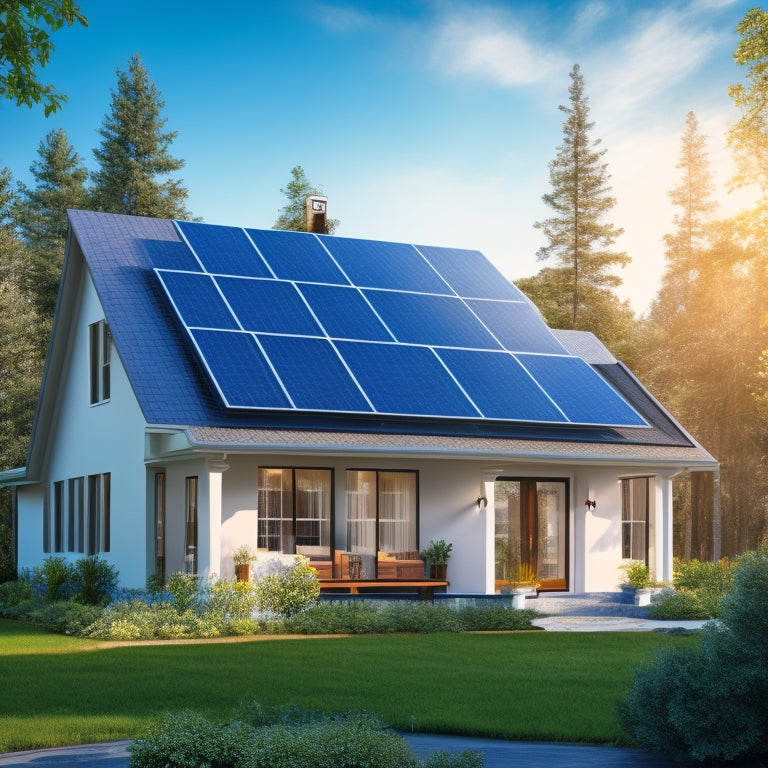
What Does a Residential Solar Panel System Cost?
Share
You're likely to spend between $15,000 and $30,000 on a residential solar panel system, depending on factors like system size, equipment quality, and installation costs. The upfront cost can be substantial, but it's crucial to contemplate the long-term benefits, including lower utility bills and potential tax incentives. System size, equipment prices, and installation labor costs all contribute to the overall expense. Additionally, permits, inspection fees, and local incentives can impact the final cost. As you weigh your options, understanding these factors will help you make an informed decision - and there's more to explore when it comes to finding the right system for your needs.
Key Takeaways
• The average cost of a residential solar panel system ranges from $15,000 to $30,000, depending on system size and quality.
• Equipment and material prices, including panels, inverters, and mounting systems, contribute to the overall expense of the system.
• Installation costs, including permits, inspections, and labor, can add up to $2,000 to $5,000 to the total cost.
• Local and state incentives, such as tax credits and rebates, can significantly offset the upfront cost of the system.
• The total cost of the system can be spread out over time through financing options, with interest rates ranging from 3% to 8% APR.
Understanding Solar Panel Costs
When it comes to investing in a residential solar panel system, understanding the costs involved is crucial, as the upfront expenditure can be substantial. As you explore harnessing the power of the sun, you'll want to weigh the financial benefits against the initial investment.
One of the primary advantages of solar energy is its energy efficiency, allowing you to generate electricity while reducing your reliance on the grid. This, in turn, can lead to significant financial benefits, including lower utility bills and potential tax incentives.
As you explore the cost of a residential solar panel system, it's vital to take into account the long-term savings. While the initial investment may seem challenging, the energy efficiency of solar panels can save you money in the long run. By reducing your energy consumption from the grid, you'll see a decrease in your utility bills, which can add up to significant financial benefits over time.
Additionally, many governments offer incentives for homeowners who invest in renewable energy, further increasing the financial benefits of going solar. By understanding the costs involved, you can make an informed decision about investing in a residential solar panel system.
System Size and Cost Factors
You'll need to take into account several key factors that impact the cost of a residential solar panel system, including the system size, which is typically measured in watts (W) and is directly tied to the number of panels required to meet your energy needs. A larger system size means more panels, which increases the upfront cost. However, a larger system can also provide more energy efficiency and savings in the long run.
Other important factors influencing the cost include roof orientation, which affects the system's energy output. A south-facing roof with minimal shading is ideal, as it maximizes energy production.
System design is also vital, as a well-designed system ensures high energy production and reduces the risk of maintenance issues. Additionally, energy storage options, such as batteries, can increase the system's cost but provide backup power during grid outages.
Equipment and Material Prices
When examining the cost of a residential solar panel system, it's crucial to grasp the equipment and material prices that contribute to the overall expense.
You'll need to take into account the breakdown of solar panel costs, which can vary depending on the quality and durability of the panels.
Furthermore, you'll have to factor in the expenses associated with installation hardware, which can add up quickly.
Solar Panel Costs Breakdown
Your solar panel system's overall cost is largely dictated by the prices of its individual components, so understanding the costs of each piece of equipment and material is essential.
Let's break down the costs to dispel any solar myths and get a clear picture of what you're paying for.
The largest expense is the solar panels themselves, which can range from $2.50 to $3.50 per watt, depending on the quality and efficiency of the panels. A typical residential system requires 15-20 kilowatts of power, putting the panel cost between $37,500 and $70,000.
The inverter, which converts DC power to AC, can add another $1,000 to $3,000 to the total cost. Energy storage systems, like batteries, can add up to $10,000 or more, but are optional.
Mounting and tracking equipment, wiring, and other components make up the remaining costs.
When calculating the total cost, be sure to factor in the installation company's labor costs, permits, and inspections. A thorough understanding of these costs will help you make an informed decision when investing in a residential solar panel system.
Panel Quality and Durability
The quality and durability of solar panels greatly impact their performance, lifespan, and overall cost, which is why it's important to understand the factors that influence their pricing.
When you're investing in a residential solar panel system, you want to make sure that your panels can withstand various environmental conditions and continue to generate power efficiently.
The quality of your solar panels is largely dependent on the manufacturer's standards and the materials used. Here are a few key factors to take into account:
-
Manufacturing standards: Look for manufacturers that adhere to strict quality control measures and comply with industry standards, such as UL certification.
-
Climate resistance: If you live in an area with extreme weather conditions, such as high winds, heavy snowfall, or intense sunlight, you'll want panels that are designed to withstand these conditions.
-
Performance warranties: A thorough warranty that covers performance and defects can provide peace of mind and protect your investment.
Installation Hardware Expenses
You'll need to budget for installation hardware expenses, which include the costs of essential equipment and materials that connect and support your solar panels, such as mounting systems, inverters, and wiring. These components play an important role in guaranteeing your system operates efficiently and safely. The type and quality of installation hardware can greatly impact your overall system cost.
The mounting system, for instance, can range from $2,000 to $5,000, depending on the complexity of the roof integration. A more intricate roof design or multiple roof angles can increase the cost of the mounting system. Inverters, which convert DC power to AC, can add another $1,000 to $3,000 to your total cost. The wiring complexity also affects the installation hardware expenses, as longer wire runs or complex connections can drive up costs.
On average, you can expect to pay between $2,500 and $6,000 for the installation hardware expenses. It's important to factor these costs into your overall budget to make sure you have a thorough understanding of your residential solar panel system's total cost.
Installation Labor Costs Breakdown
When exploring the installation labor costs breakdown, it's important to bear in mind that labor hourly rates vary depending on factors like location and experience.
It's paramount to take into account the costs of permits and inspections, which can add up quickly.
In addition, electrician certifications can impact labor costs, so it's crucial to understand how these factors intersect to determine your overall installation expense.
Labor Hourly Rates
Your labor hourly rate for installing a residential solar panel system typically ranges from $75 to $150 per hour, depending on factors like location, installer experience, and system complexity. These rates can vary greatly depending on your location, with urban areas tend to have higher labor costs compared to rural areas.
Keep in mind that labor laws and union wages can also influence labor hourly rates. For instance, if you're in an area with a strong union presence, you might expect higher labor costs due to union wages.
Here are some key factors that can impact your labor hourly rate:
-
Location: Labor costs can differ significantly depending on the city, state, or region you're in.
-
Installer experience: More experienced installers may charge higher hourly rates due to their expertise and reputation.
-
System complexity: Larger or more complex systems may require more specialized labor, increasing hourly rates.
Permits and Inspections
Obtaining necessary permits and passing inspections account for a significant portion of installation labor costs, with these expenses typically ranging from 5% to 15% of the total system cost. As a homeowner, you'll need to make sure that your solar panel system meets local building codes and municipal requirements. This involves obtaining permits from your local government, which can add to the overall cost.
Here's a breakdown of the typical permits and inspections involved in a residential solar panel installation:
| Permit/Inspection | Cost Range |
| Electrical permit | $100-$500 |
| Building permit | $200-$1,000 |
| Final inspection | $100-$500 |
| Municipality-specific permits | $100-$1,000 |
Keep in mind that these costs can vary depending on your location, system size, and local regulations. It's crucial to factor these expenses into your overall budget in order to ensure a smooth and compliant installation process.
Electrician Certifications
With permits and inspections in place, you'll need to verify that the electrician installing your residential solar panel system has the necessary certifications to guarantee a safe and efficient installation. This is important, as improper installation can lead to safety hazards, reduced system performance, and even void your warranty.
When selecting an electrician, look for the following certifications:
-
Licensing requirements: Make sure the electrician holds a valid license in your state, which typically requires passing a certification exam and completing continuing education requirements.
-
Code compliance: Confirm that the electrician is knowledgeable about local building codes and regulations, ensuring your system meets all necessary standards.
-
Manufacturer certifications: Check if the electrician has received training and certification from the solar panel manufacturer, ensuring they're familiar with the specific equipment and installation requirements.
Permits and Inspection Fees
By the time you're ready to install your residential solar panel system, you'll need to factor in the costs of permits and inspection fees, which can vary widely depending on your location and local regulations. These costs can add up quickly, so it's crucial to understand what you'll need to budget for.
In most areas, you'll need to obtain a building permit before installing your solar panel system. This permit guarantees that your installation meets local building codes and safety standards. The cost of this permit can range from $500 to $2,000, depending on the complexity of your installation and your location.
Additionally, you may need to comply with city regulations and zoning restrictions, which can add to the overall cost. For example, some cities have specific requirements for the installation of solar panels on historic homes or in certain neighborhoods.
Inspection fees are also a necessary expense, as a certified inspector will need to verify that your system meets local electrical and building codes. These fees can range from $100 to $500, depending on the complexity of the inspection.
Local and State Incentives
Your local and state governments offer various incentives to encourage the adoption of residential solar panel systems, and you can greatly reduce your upfront costs by taking advantage of these programs.
These incentives can greatly offset the initial investment, making solar energy a more accessible and affordable option for homeowners.
Some of the local and state incentives you may be eligible for include:
-
Tax credits: Many states offer tax credits for residential solar panel systems, which can provide a substantial reduction in your taxable income.
-
Rebate programs: Your local government or utility company may offer rebate programs that provide a one-time payment or credit towards your solar panel system.
-
Property tax exemptions: Some states exempt the added value of a solar panel system from your property taxes, reducing your overall tax burden.
Total System Cost and ROI
Determining the total system cost and ROI of your residential solar panel system is essential in evaluating the feasibility and profitability of your investment. You need to assess the upfront cost, system financing options, and potential cost savings to make an informed decision.
Here's a breakdown of the estimated costs and savings:
| Category | Cost/Savings | Description |
|---|---|---|
| System Cost | $15,000 - $30,000 | Average cost of a residential solar panel system |
| System Financing | 3% - 8% APR | Interest rates for solar panel system financing options |
| Cost Savings | $400 - $1,000/year | Average annual savings on electricity bills |
When evaluating the total system cost, you should take into account the upfront cost of the system, as well as financing options and potential cost savings. With system financing options available, you can spread the cost over time, making it more manageable. Additionally, you can expect significant cost savings on your electricity bills, which can help offset the initial investment. By understanding the total system cost and ROI, you can make a more informed decision about investing in a residential solar panel system.
Frequently Asked Questions
Can I Install Solar Panels on My Rented Property?
You'll need to check your renter rights and obtain your landlord's approval before installing solar panels on your rented property, as modifications may be subject to their consent and local regulations.
Are Solar Panels Durable in Extreme Weather Conditions?
You'll be relieved to know that solar panels are designed to withstand extreme weather conditions, boasting impressive weather resistance and storm tolerance, ensuring your system remains operational even in harsh environments.
Will Solar Panels Increase My Property's Value?
As you ponder the impact on your property's value, rest assured that solar panels will boost your Property Appraisal, yielding significant Resale Benefits, making your home more attractive to potential buyers in the future.
Can I Monitor My Solar Panel System's Performance Remotely?
You can track your solar panel system's performance remotely through mobile apps, optimizing energy efficiency and transforming your home into a smart home, allowing you to monitor and control your energy production in real-time.
Are Solar Panels Recyclable at the End of Their Life?
As you envision a greener future, you'll be relieved to know that solar panels are recyclable, undergoing a meticulous recycling process that minimizes environmental impact, ensuring a sustainable cycle for a cleaner tomorrow.
Related Posts
-

Why Regular Vehicle Panel Maintenance Matters Locally
You know that regular vehicle panel maintenance is essential to optimize your vehicle's performance, energy efficienc...
-

5 Best Practices for Long-Lasting Sustainable Batteries
To maximize the lifespan of your batteries, you should optimize charging cycles by maintaining a charge level between...
-

Boosting Motorcycle Performance With High-Torque Upgrades
You're seeking to maximize your motorcycle's full potential with high-torque upgrades. By swapping to a high-torque m...


